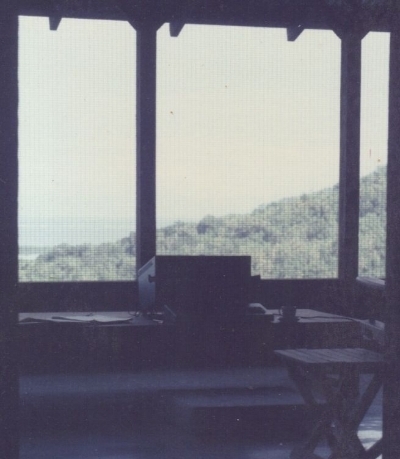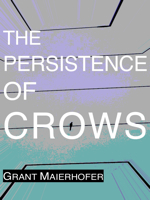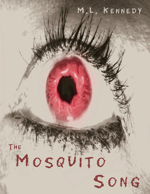
From my cushion on the floor I couldn’t see the view, only the wide blue sky on days it was blue (and an angry grey on rainy days). But I knew without looking what was there, below my cliff side house: a wide bay, an aquamarine lagoon reaching out toward breakers on a fringing reef, then the midnight blue of the deep ocean beyond, and above that a baby-blue sky sporting a variety of cottony clouds.
The view ranks as the most spectacular of any of my writing places. Although I am still partial to the small back window of my San Francisco apartment, a window I left open summer and winter. Pigeons perched on the windowsill, they cooed but never invited themselves all the way inside. Outside, over rooftops, was the Hilton’s silver-paneled cylinder and way off the East Bay hills, snow-dusted one day or two a year. Directly below the window, a vacant lot where the homeless sometimes slept in shacks of cardboard construction. It was the Tenderloin, after all.
In rural Louisiana the sliding doors of my tiny studio looked out on a grassy slope where I could hear deer prancing at night. To the right, my mother’s vegetable garden snuggled behind a chain link fence softened by the climber Mme. Alfred Carriere with her boudoir-pink blooms, and at the bottom of the grassy slope, a large pond whose reedy shallows hosted visits from high-stepping white egrets.
Now I have only the sandstone siding of building opposite and a small green verge in between where a neighbor walks her shitty little dogs and never bothers to pick up the poop. She thinks no one is watching. But like John Cheever, I live behind the potted palm and from here I can see everything.
Anyway, when one is writing, the view outside disappears and one wraps oneself in the imaginative place being created on that white page — whether actual paper in a typewriter (as of yore) or the computer screen. That imaginative landscape is all that matters.
Today, while the shitty little dogs cavorted on the lawn and I worked on a poem about the summer my father died, I lived in the landscape of my parents small place in Louisiana. And when I actually lived in Louisiana, my mind’s eye lived in the landscape of Micronesia where my fictional Miss Gone-overseas lived. And when I let my eyes wander to the pigeons on the windowsill of my apartment in San Francisco what my mind’s eye saw was my grandparent’s East Texas home, the setting for a novella I was writing at the time.
Bottom line — the actual view does not matter one bit, nor is it a distraction. What matters is the amount of time a writer has to devote to his or her craft. One must carefully select a form most suited to that amount of time, and these days small poems work best for me.








